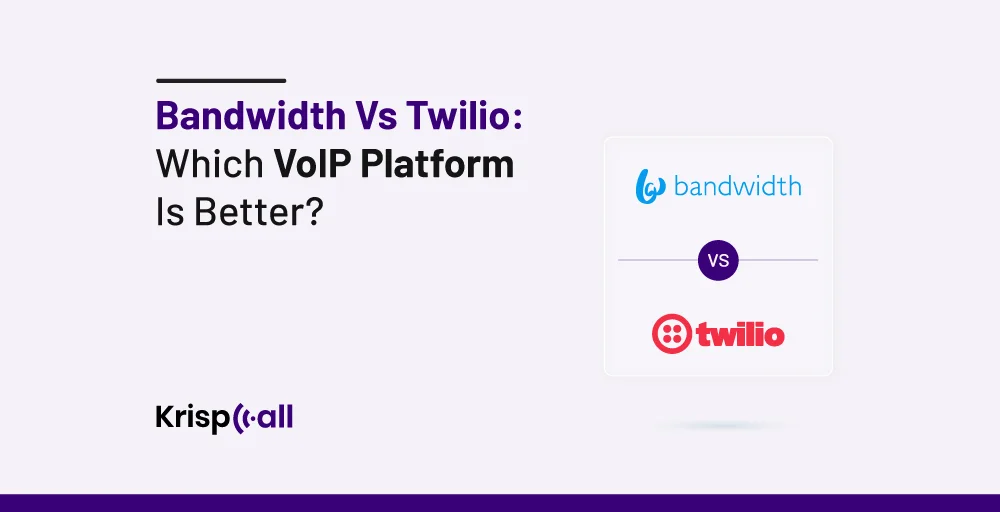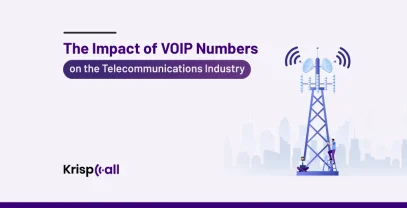In the modern business world, VoIPs have become integral to business operations over the last decade.
VoIP enhances a business’s communication system. That’s why business owners can’t help but integrate it into their business.
However, with many VoIP options, the question is, “Which VoIP is actually the best?” 🤔
This article compares two widely used VoIPs – Bandwidth and Twilio– and their pros and cons, features, pricing models, user experience, integration options, customer support quality, and security measures.
Let’s begin 👇
🔑 KEY HIGHLIGHTS
- Bandwidth and Twilio are popular VoIP platforms with competitive features and pricing.
- Both offer voice, messaging, and other communication tools through APIs.
- Twilio has a larger feature set and over 600 integrations compared to Bandwidth’s 10 integrations.
- User reviews gave Bandwidth higher ratings for its easy interface, voice quality, and outstanding customer support. Some critiqued Twilio support.
Bandwidth Vs. Twilio: At a Glance
| Character | Bandwidth | Twilio |
| Monthly Price | Starting at $0.0075 per minute | $0.0075 per minute for US and Canada, with higher rates internationally |
| Core Services | Voice, messaging, 911 connectivity, wireless number services | Voice, messaging, video, chat, email, SMS, MMS |
| Global Reach | Available in 65+ countries | Available in over 150 countries |
| User Interface | Web portal and APIs | Web portal, APIs, CLI, and mobile/desktop apps |
| Scalability | Usage-based scalability | Horizontal scaling across regions and vertical scaling within regions |
| Reliability | 99.99% uptime SLA | 99.999% uptime, Five 9s SLA |
| Market Focus | From SMEs to large enterprises | From startups to large enterprises |
| Compliance and Security | SOC 2 certified, GDPR and HIPAA compliant | GDPR and HIPAA compliant, ISO 27001 certified |
| Customer Support | Community forums, phone, email | Phone, community forums, account managers, developers support portal |
Bandwidth Vs Twilio Features & Functionality
Bandwidth and Twilio are two of the popular VoIP software that bring their own features and functionality.
Bandwidth Features & Functionality
As a global cloud platform, Bandwidth provides many features, such as:
Voice API
The Voice API allows enterprises to integrate flexible and scalable voice calling capabilities into their applications with accurate billing from Bandwidth.
Its global Voice API permits the customization of voice calling solutions tailored to businesses and customers. Outbound calling to international numbers is supported.
Additional voice API features include call routing controls, call tracking, extensive documentation for developers, and conferencing options.
Messaging API
Bandwidth’s Messaging APIs enable companies to build SMS, MMS, and toll-free texting functions into their products and software. Organizations can add programmable messaging directly into apps or systems using SMS APIs.
The platform also provides a group messaging API requiring no additional plugins. Users can transmit images, videos, audio, emojis, and GIFs.
Emergency calling API
The Emergency Calling API ensures stable emergency service connections. It permits reliable public safety and first responder access without expensive infrastructure.
Location details are automatically generated for faster emergency response agency assistance.
Video API
The video API facilitates starting video calls from platform UIs to connect face-to-face regardless of user locations. Video can also be embedded into any web app for smooth in-browser experiences.
Additionally, enterprises can upgrade any web chat or call to video without complicated deployment using Bandwidth’s video API.
Twilio Features & Functionality
The features offered by Twilio are as follows:
Omnichannel communication
Twilio’s programmable chat, voice API, and video across multiple platforms allow for omnichannel communication.
The Programmable Chat service supports chat and chatbot creation with useful features like displaying online status and saving message history. Programmable Voice API enables the building and monitoring of calling systems.
Programmable Video offers high-quality video using WebRTC for flexible uses like online appointments, conferences, and customer support.
Twilio Studio
Twilio Studio allows for the holistic control of omnichannel communication processes through a unified system. Its visual interface provides an easy way to create, edit, and manage communication workflows in a simple drag-and-drop manner conducive to rapid prototyping.
Twilio Studio’s capabilities can address nearly any digital communication requirement, from order notifications and automated phone systems to survey tools and chatbots that integrate SMS functions.
Moreover, the Studio platform’s visual nature streamlines the implementation of communication flows for various business needs within a single integrated environment.
End-to-end contact center support
Twilio’s Programmable Chat, Voice, and Video tools can easily build contact center solutions for customer service. However, to organize contact center support with the full process including call and request handling and follow-ups, Twilio created a specialized product called Twilio Flex.
Twilio Flex is the only fully programmable contact center platform that enables companies to deploy multiple engagement channels while providing customization tools. It allows building, modifying, or extending solutions freely without typical SaaS restrictions.
The platform offers many out-of-the-box capabilities. It integrates tightly with Twilio products and also acts as their back-end system. Developers can create custom interfaces and logic to fit their specific requirements through its customization features.
Bandwidth Vs Twilio Pricing and Plan
Both platforms have usage-based call pricing, with Twilio rates slightly higher at $0.01 per minute for inbound vs $0.0055 for Bandwidth.
Bandwidth provides fixed monthly rates for phone lines, while Twilio only lists usage prices. Bandwidth also separates messaging pricing, but Twilio does not specify messaging rates.
Overall, Twilio may be more expensive for lower-volume usage, whereas Bandwidth offers pricing tiers and per-line rates that could reduce costs depending on business needs.
Bandwidth Vs Twilio: User Experience and Interface
How user-friendly is Twilio compared to Bandwidth? Let’s learn more about it.
A. Ease of setup and onboarding
Due to its focus on small businesses, Bandwidth may have an easier overall setup and onboarding process. Bandwidth’s customer support is often praised, suggesting that setup assistance is available.
Meanwhile, Twilio is aimed at both startups and large enterprises, so its process could assume more technical know-how.
B. User interface design and intuitiveness
Regarding the user interface, Twilio offers web portals and mobile/desktop applications for managing accounts.
Bandwidth’s portal also enables essential management of numbers and lines. Between the two, Twilio’s suite of companion apps may provide a more fully-featured interface.
C. Customization options and flexibility
Twilio seems to offer stronger customization capabilities in the long term. Its extensive documentation aids in building complex workflows without coding everything from scratch.
However, Bandwidth still provides versatile features through APIs that allow customizing solutions. Both afford flexible options, though Twilio’s applications and documentation handholding may empower more do-it-yourself personalization.
Twilio Vs Bandwidth: Integrations and Compatibility
A. Third-party integrations available
Twilio supports significantly more third-party integrations (600) than Bandwidth (10). Twilio has built a larger partner network than Bandwidth, which simplifies linking Twilio phone numbers with popular CRMs, help desks, and marketing tools used by many businesses.
B. Compatibility with popular business tools (e.g., CRM systems, productivity suites)
Twilio integrates with major CRM platforms, including Microsoft Excel, WordPress, and productivity suites. Likewise, Bandwidth integrates with fewer notable platforms like Salesforce and Zendesk. Twilio shows superior compatibility.
C. API availability and developer resources
As a pioneer communication API company, Twilio provides stronger APIs and extensive developer resources to build customized solutions, as evidenced by its large partner ecosystem. While Bandwidth supports APIs, Twilio leads in programming tools and documentation to facilitate integrations based on URL coverage.
Bandwidth Vs Twilio: Security and Compliance
A. Data encryption and privacy
Both companies extensively encrypt customer data to protect privacy. Bandwidth encrypts data in transit using AES-256 and at rest, whereas Twilio also uses these standards (AES encryption at rest for all services), providing a high level of security.
However, Twilio provides more granular control over SendGrid: It provides opportunistic TLS v1.1+ encryption for email by default, but customers can apply strict TLS if necessary.
B. Compliance
Regulatory-wise, both are well-equipped, but Twilio provides more details about the certifications it has earned for different services. ISO 27001, 27017, 27018, and SOC 2 Type 2 certification for all services demonstrate a rigorous compliance program.
In addition, Twilio’s PCI DSS certifications (Levels 1 and 4) show that Twilio has undergone extensive testing on payment data security. Although Bandwidth addresses compliance with various standards, it does not specify certifications at the same level as Twilio.
C. Security Features
Bandwidth offers more robust security features than Twilio. It uses strong encryption methods for messaging and calls, multifactor authentication, regular risk evaluations, and maintains SOC 2 Type 2 compliance.
Although Twilio uses encryption, it lacks some of Bandwidth’s advanced protections because it does not offer multifactor authentication by default for account access.
Additionally, Bandwidth offers controls such as blocking calls from high-risk locations and real-time signaling to detect and prevent threats, whereas Twilio provides fewer customizable filters only.
With its robust encryption, multi-layer authentication, proactive review processes, and security tools, Bandwidth seems to have a better security stance compared to Twilio’s less comprehensive protections.
Twilio Vs Bandwidth Customer Support
According to user reviews on G2, Bandwidth has stronger customer support than Twilio. For responsiveness, Bandwidth received an average rating of 4.6/5 compared to 3.7 for Twilio.
Users report that Bandwidth representatives are very responsive, often answering questions within an hour. However, some Twilio customers commented that it can take over 24 hours to get a response.
In terms of support availability, Bandwidth received a perfect 5/5 rating while Twilio received 4.2. Bandwidth support is available 24/7 by phone, whereas Twilio has more limited weekday availability.
Bandwidth Vs Twilio User Reviews
Bandwidth seems to have more positive user reviews than Twilio. Reviews on sites like Getapp and Capterra consistently rate Bandwidth higher in areas like service quality, reliability, support responsiveness, and cost-effectiveness.
Users appreciate Bandwidth’s proactive monitoring that prevents issues and praise the quick response times from support. In contrast, while some reviews like Twilio’s features, others criticize outages, poor documentation, and slow response times. In addition, Twilio customers often complain about unexpected overage charges.
Bandwidth’s clear telecommunications focus is also apparent in user feedback. Reviews note it is much easier to understand plans, pricing, and features with Bandwidth versus Twilio’s integration of multiple products.
Bandwidth clients especially commend the customizable controls and thorough guidance provided. Twilio users found features less uniform across plans. Finally, bandwidth often receives perfect or near-perfect ratings, while Twilio reviews express mixed levels of satisfaction. The consistently positive sentiment from users brands Bandwidth as the superior option based on customer experience.
Bandwidth Vs Twilio: The Pros & Cons
With both Bandwidth and Twilio providing exceptional features, let’s discuss some of their advantages and disadvantages.
Pros of Bandwidth
The Pros of bandwidth are:
- Global functionality: VoIP phone services extend widely globally, allowing potential international scalability. Number portability reaches 65+ countries.
- Retail and wholesale options: Bandwidth provides VoIP solutions tailored for enterprises either directly or via resellers.
- Comprehensive & versatile features: Functions like cloud-ready voice, messaging, and emergency support maximize flexibility, making it suitable for businesses needing a full communication toolkit.
- User-friendly administration: An intuitive dashboard eases managing, ordering, and configuring multiple numbers and line choices.
- Appealing customer assistance: Some reviews highlight strong overall customer support, leaving clients assured Bandwidth can solve any arising problems.
Cons of Bandwidth
The cons of bandwidth are:
- Fewer typical customers and languages supported than alternatives.
- Lacks options for route changes and SMS dashboard availability.
- The password reset process requires too much effort for one user.
- Limited ability to order multiple rate centers or update orders.
- Fewer features and alternatives compared to peers in reviews.
Pros of Twilio
Twilio stands out because of several key advantages, such as:
- Thorough documentation: All products come with extensive guides that smoothly allow customizing workflows, setting up integrations, and fully utilizing features.
- Simple setup for complex workflows: Documentation and visual tools permit the setting up of intricate processes without extensive coding, streamlining the initial and ongoing setup.
- Versatile communication channels: The Messaging API backs SMS, MMS, OTT, and email worldwide outreach via redundant carrier connections and multiple number types.
- Comprehensive applications: Tools like Flex, Segment, and Frontline boost customer interactions across channels by leveraging data for personalized engagement.
- Extensive customizable features: Notable capabilities involve the Voice API for customized voice experiences through features such as interactive voice response, speech recognition, and quality connections on the Super Network.
- Flexible transparent pricing: Pricing is clear-cut, permitting paying only for usage or selecting committed-use rates.
Cons of Twilio
- Some support team members were described as rude, unhelpful, and lacking product knowledge.
- Account executives were misleading clients, according to one negative review.
- Pricing structures and bills could be reduced further, according to one piece of feedback.
- API and/or specific features not covering all required languages.
Bandwidth Vs. Twilio Vs. KrispCall: Which VoIP Platform Is Better?
Bandwidth and Twilio are well-established VoIP platforms, but they have some limitations compared to KrispCall.
Likewise, bandwidth offers excellent features and reliable global infrastructure. However, its self-service capabilities are more limited than other options like Twilio and KrispCall.
Let’s explore the features between KrispCall, Bandwidth, and Twilio to determine which is better.
Cost Effective
Twilio and bandwidth breakdown pricing is based on usage. For instance, Twilio begins at $0.0085 per minute to receive calls and $0.014 per minute to place calls.
Bandwidth pricing begins at $0.010 per minute to make domestic outbound calls and $0.0055 per minute to make domestic inbound calls.
This differs from KrispCall’s simpler flat rate model. KrispCall enables significant savings on call costs compared to Bandwidth and Twilio, potentially reducing phone bills by as much as 33.33% for small businesses.
KrispCall has a transparent payment model. Businesses pay a fixed monthly charge per employee that corresponds to the selected program. Plan pricing starts as low as $12 monthly for each user who commits to an annual payment.
Highly secure and reliable
Some VoIP platforms have a lackluster reputation for reliability, with users often reporting issues like failed deliveries, dropped calls, or poor audio quality.
Across reviews, customers complained about unreliable performance on both Twilio and Bandwidth networks, including concerns over message delivery. Therefore, carefully selecting a provider that ensures consistent functionality is important.
KrispCall prides itself on delivering high reliability and security, recognizing these are critical for business communications.
KrispCall guarantees a 99.999% uptime through protective measures such as an encrypted secure network, which is validated by third-party audits to provide dependable and safe calling and messaging.
24/7 Customer Support
Some reviews of Twilio and Bandwidth mentioned problems with customer service, like slow responses or a few ways to get help.
KrispCall provides 24/7 customer support on all plans. Customers can get assistance through email, online chat, or by phone at any time. The company also offers support across multiple offices or locations. Plus, all customers receive real-time updates on system issues, no matter which subscription they have.
Enhanced accessibility
Twilio and Bandwidth Inc services are not easy to use everywhere in the world.
Twilio relies too much on the public internet that regular people use. But, the internet is not always fast or reliable in different countries. This causes slow loading times and connection issues when using Twilio from other places.
For Bandwidth, signing up can be difficult without local assistance. Many places don’t have their automatic tools or customer support communities either. New customers elsewhere have a tough time getting set up and troubleshooting problems themselves.
With KrispCall, people can make and receive calls from anywhere globally if they have an internet connection. This provides total flexibility and portability.
For companies with mobile employees, it is more necessary to allow calling from any device using the KrispCall mobile app or desktop application on an existing phone, whether in or outside the office. Workers don’t need to be in the workplace to access their business line.
KrispCall: Top Quality VoIP at Unbeatable Prices
Bandwidth and Twilio offer VoIP, SIP trunking, and communication solutions with unique features, but KrispCall leaves them behind as a top cloud telephony software.
KrispCall excels with a flexible, easy-to-use collaborate platform that does not require developers or engineers for basic use. Teams can start talking without technical assistance.
KrispCall is more focused on cost savings, extensive features, collaboration tools, and reliability. This makes it an appealing comprehensive communication solution for businesses, particularly those looking for a tool with minimal setup complexity.
All KrispCall products aim to maintain performance through intuitive design, ensuring quick and efficient adoption, even for non-technical users. Whether you need a basic phone system or advanced contact center solutions across multiple channels, KrispCall presents a viable option for diverse business needs.
Final Thoughts
Both Twilio and Bandwidth offer a wide range of services that can help you achieve your business goals. However, choosing between the two of them (or any other VoIP) must be based on the specific goals and objectives of your business organization.
Carefully evaluating your organization’s communication needs, budget constraints, technical requirements, and desired scalability will help identify which provider can meet your unique enterprise telephony requirements both in the short and long term.
Curious how to enhance your company’s communication abilities? Review these top cloud phone systems that can help your business prosper.





